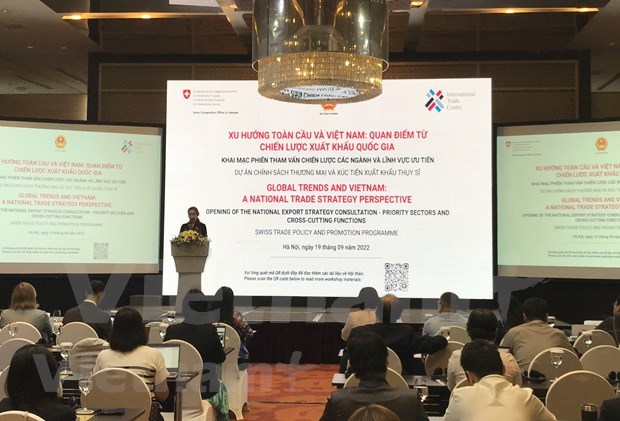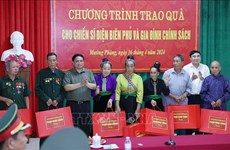Green economy: new growth engine for import-export activities
 Participants at the seminar “Global Trends and Vietnam: A National Trade Strategy Perspective” (Photo: VNA)
Participants at the seminar “Global Trends and Vietnam: A National Trade Strategy Perspective” (Photo: VNA)Hanoi (VNA)- The import-export strategy toward 2030, approved by the Prime Minister, encouraged the development of environmentally friendly products and the green economy.
This information was delivered by a representative from the Ministry of Industry and Trade at a workshop held on September 19 in Hanoi.
Titled "Global Trends and Vietnam: A National Trade Strategy Perspective,” the event was organised by the Technical Assistance Project on Trade Policy and Export Promotion sponsored by the Swiss government.
Evaluating 10 years of implementing the import-export strategy for 2011-2020, the Ministry of Industry and Trade said Vietnam's they have seen impressive achievements, making important contributions to the country's economic reform and development.
Specifically, in the 2011-2020 period, the total import-export turnover of goods increased 2.7 times, from 203.6 billion USD in 2011 to 545.3 billion USD in 2020.
In terms of export scale, Vietnam leaped to the 32nd ranking in 2015 and the 22nd in 2020 from the 41st in 2011. Vietnam’s imports in 2020 jumped to the 19th position from the 33rd in 2011. Since 2016, Vietnam has always recorded a trade surplus.
Despite the positive fact, the country’s economy has yet fully utilized its advantages to create export groups with high competitiveness and high level of scientific and technological application.
Therefore, the government’s import-export development strategy until 2030 has thoroughly grasped the policy and direction of socio-economic development, paying attention to new trends in international economic and trade such as green economy, digital economy, and circular economy.
Ms Nguyen Thuy Hien, Deputy Director of the Planning Department under the Ministry of Industry and Trade, said the ministry has defined the development of green growth and green economy as one of the new growth drivers of the country in the near future.
“In that sense, the development of green renewable energy is important.”
Bui Quang Tuan, Director of the Vietnam Institute of Economics, said trade policies should focus on supporting small-and medium-sized enterprises (SMEs) to create environmentally-friendly products.
“This is important since choosy markets like the EU are moving very fast in green transformation. Policies need to adapt to new trends while expanding the market, creating a driving force for the development of green products and meeting the requirements of green transformation.”
Accelerating digital transformation
Digital transformation is a very important factor to promote trade exchanges between countries, according to exports.
The COVID-19 pandemic, though exerting serious impacts on the global economy, also presents an opportunity to accelerate the digital transformation and bring into play the advantages of the modern economy.
Nguyen Van Nam, former director of the Institute of Trade Studies under the Ministry of Industry and Trade, said in order to realize digital transformation, the government needs to create institutions and policies to promote green economy and digital economy.
“Businesses need to pay attention to product quality and market demand as well as invest in information networks, software, and equipment to create driving forces for economic growth and push ahead with training digital human resources both in foreign languages and informatics to grasp the development trend of the world.”
According to Sibylle Bachmann, Deputy Head of the Cooperation Department of SECO, global consumers tend to consume greener and more sustainable products, so Vietnamese enterprises need to focus on creating green products with low carbon emissions.
From international experience in the development of green finance and green bonds, Bachmann advised Vietnamese businesses to follow global trends as well as meet international standards to improve the competitiveness of their products.
At the conference, the International Trade Center (ITC) also made recommendations for Vietnam in identifying priority industries, including electronics, environmental goods, wood and furniture, agricultural products and textiles.
In addition, five areas of commercial competition are digital transformation; innovation and entrepreneurship; quality, standards and certifications; sustainability and trade facilitation.
These sectors will make important contributions to the value chain and export development, according to the participants./.













